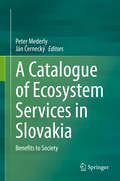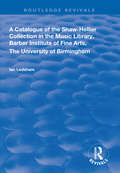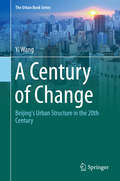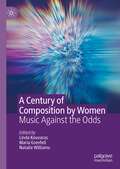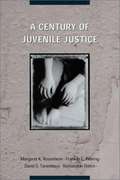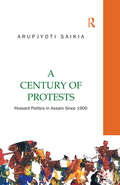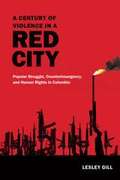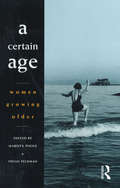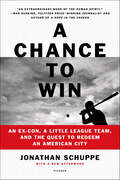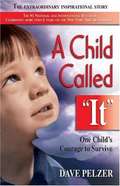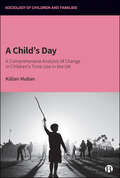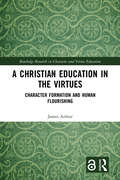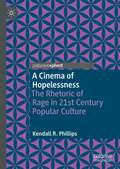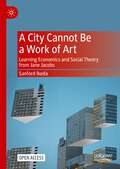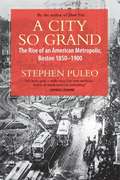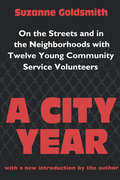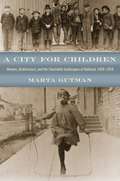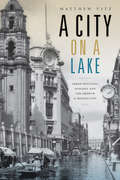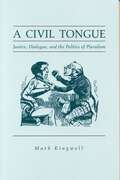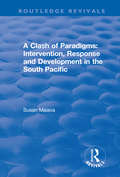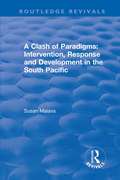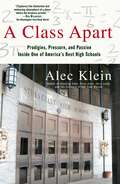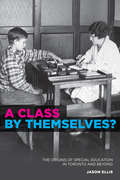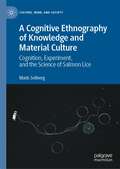- Table View
- List View
A Catalogue of Ecosystem Services in Slovakia: Benefits to Society
by Peter Mederly Ján ČerneckýThis book provides the first comprehensive assessment of ecosystem services (ES) for the territory of the Slovak Republic. Although the ES approach is widely used for the evaluation of the benefits of natural capital and biodiversity for people, this book has a unique character. It provides an assessment of 18 individual ES, which are divided into three main groups - provisioning, regulatory/supporting and cultural ES. For each of ES, a brief theoretical and methodological overview is given, followed by spatial assessment based on own original methodology and dataset of 40 map layers. Besides, an evaluation of main ES groups and overall ES assessment is realized. This book emphasizes the key role of nature protection areas, large areas of forest ecosystems and mountain and sub-mountain areas, for the preservation of the various functions of the healthy landscape and ecosystems. The complexity of the book guarantees its usefulness - not only as the knowledge base for the territory of Slovakia but also as the methodological tool for worldwide researchers.
A Catalogue of the Shaw-Hellier Collection (Routledge Revivals)
by Ian LedshamIn this compilation, first published in 1999, Ian Ledsham compiles an extensive catalogue of the Shaw-Hellier Collection, complete with diagrams regarding how we use text.
A Century of Change: Beijing's Urban Structure in the 20th Century (The Urban Book Series)
by Yi WangThis book provides a comprehensive overview of the evolution of Beijing's urban structure in the 20th century, analyzing essential social and economic changes in the housing sector. Focusing on the urban changes that took place under the market economy after 1978 and beyond, the book addresses the demolition of courtyard houses in Beijing's old city, the relocation of low-income families from the old city, the government's role regarding housing in the city, and residential segregation in Beijing. Expanding on the author's PhD thesis at the University of Cambridge, it is illustrated with a wealth of historic photos and maps of Beijing. Presenting relevant descriptions, extensive literature and case studies, the book offers a valuable resource for students and scholars of architecture, urban studies and Chinese studies. First published in 2013 by Pace in Hong Kong, it has since been added to the libraries of many distinguished universities, including Harvard, MIT, Princeton, Columbia, Yale, Stanford, Cornell, U Penn, NYU, UC Berkeley, Hong Kong University, UBC in Canada and the University of Witwatersrand in South Africa.
A Century of Composition by Women: Music Against the Odds
by Natalie Williams Linda Kouvaras Maria GrenfellThis book presents accounts of creative processes and contextual issues of current-day and early-twentieth century women composers. This collection of essays balances narratives of struggle, artistic prowess, and of "breaking through" the obstacles in the profession. Part I: Creative Work – Then and Now illuminates historical and present-day women’s composition and various iterations and conceptions of the “feminine voice”; Part II: The State of the Industry in the Present Day provides solutions from the frontline to sector inequities; and Part III: Creating; Collaborating: Composer and Performer Reflections offers personal stories of current creation in music. A Century of Composition by Women: Music Against the Odds draws together topical issues in feminist musicology over the past century. This volume provides insight into the professional and compositional procedures of creative women in music and stands to be relevant for composers, performers, industry professionals, students, and feminist and musicological scholars for many years to come.
A Century of Juvenile Justice
by Margaret K. Rosenheim Bernardine Dohrn David S. Tanenhaus Franklin E. ZimringSince its inception in Illinois in 1899, the juvenile court has become a remarkable legal and social institution all over the developed world, one that plays a singular role in modern government. At its founding, the juvenile court was intended to reverse longstanding legal traditions, and place the child's interests first in areas of law ranging from dependency to delinquency. Yet in recent years legal responses to youths' offenses have undergone striking changes, as more juveniles are being transferred to adult courts and serving adult sentences. A Century of Juvenile Justice is the first standard, comprehensive and comparative reference work to span the history and current state of juvenile justice. An extraordinary assemblage of leading authorities have produced a accessible, illustrated document, designed as a reference for everyone from probation personnel and police to students, educators, lawyers, and social workers. Editors' introductions place into context each of the book's five sections, which consider the history of the ideas around which the system was organized and the institutions and practices that resulted; the ways in which this set of institutions and practices interacts with other aspects of government policy toward children in the U.S. and in other nations; and also the ways in which changing social and legal meanings of childhood and youth have continued to influence juvenile justice. The doctrine and institutions of juvenile justice in Europe, Japan, England, and Scotland are profiled in depth to show the range of modern responses to youth crime and child endangerment. This comparative material provides a fresh basis for judging the direction of policy in the U.S.
A Century of Protests: Peasant Politics in Assam Since 1900
by Arupjyoti SaikiaAddressing an important gap in the historiography of modern Assam, this book traces the relatively unexplored but profound transformations in the agrarian landscape of late- and post-colonial Assam that were instrumental in the making of modern Assamese peasantry and rural politics. It discusses the changing relations between various sections of peasantry, state, landed gentry, and politics of different ideological hues — nationalist, communist and socialist — and shows how a primarily agrarian question concerning peasantry came to occupy the centre stage in the nationalist politics of the state. It will especially interest scholars of history, agrarian and peasant studies, sociology, and contemporary politics, as also those concerned with Northeast India.
A Century of Violence in a Red City: Popular Struggle, Counterinsurgency, and Human Rights in Colombia
by Lesley GillIn A Century of Violence in a Red City Lesley Gill provides insights into broad trends of global capitalist development, class disenfranchisement and dispossession, and the decline of progressive politics. Gill traces the rise and fall of the strong labor unions, neighborhood organizations, and working class of Barrancabermeja, Colombia, from their origins in the 1920s to their effective activism for agrarian reforms, labor rights, and social programs in the 1960s and 1970s. Like much of Colombia, Barrancabermeja came to be dominated by alliances of right-wing politicians, drug traffickers, foreign corporations, and paramilitary groups. These alliances reshaped the geography of power and gave rise to a pernicious form of armed neoliberalism. Their violent incursion into Barrancabermeja's civil society beginning in the 1980s decimated the city's social networks, destabilized life for its residents, and destroyed its working-class organizations. As a result, community leaders are now left clinging to the toothless discourse of human rights, which cannot effectively challenge the status quo. In this stark book, Gill captures the grim reality and precarious future of Barrancabermeja and other places ravaged by neoliberalism and violence.
A Certain Age: Women growing older
by Marilyn Poole; Susan FeldmanOlder women run their own businesses. Older women go to aerobics classes. Older women fall in love. In fact, older women have active lives and make a major contribution to the community despite the the public assumption that they are past their use-by date.A Certain Age explores the public and private worlds of older women. Challenging the emphasis on declining health in other studies of ageing, it looks at the interactions between older women and family, friends and the community, as well as their work and leisure activities. The authors discuss the factors that are important in older woman's lives such as home, menopause, fitness, learning, widowhood and intimacy. They show that many older women maintain good health and an independent lifestyle while others experience barriers that prevent them from continuing to be active members of their community.A Certain Age is valuable reading for anyone who works with older people, develops programs or policies for older people, or is interested in the experience of growing older.
A Chance to Win: Boyhood, Baseball, and the Struggle for Redemption in the Inner City
by Jonathan SchuppeA Pulitzer Prize-winning journalist follows an embattled Little League team in inner-city Newark, New Jersey, revealing the complex realities of urban life in one of America's most dangerous citiesWhen Rodney Mason, an ex-con drug dealer from Newark's rough South Ward, was shot and paralyzed, he vowed to turn his life around. A former high-school pitching ace with a 93 mph fastball, Mason decided to form a Little League team to help boys avoid the street life that had claimed his youth and mobility. Predictably, the players struggle—they endure poverty, unstable family lives with few positive male role models, failing schools, and dangerous neighborhoods—but through the fists and tears, lopsided losses and rare victories, this bunch of misfits becomes a team, and in doing so gives the community something to root for. With in-depth reporting, fascinating characters, and vivid prose, Jonathan Schuppe's A Chance to Win is both a penetrating, true-to-life portrait of what's at stake for kids growing up poor in America's inner cities and a portrait of Newark itself, a struggling city that has recently known great hope as well as failure.
A Child Called "It": One Child's Courage to Survive
by Dave Pelzer<P>"Dave Pelzer's child experience is a testimony to the triumph of the human spirit. This book vividly articulates the abuse he suffered at the hands of his mother and the unbelievable apathy of others to his plight. Pelzer's courage and determination will go a long way in helping the millions of children in America who, too often, suffer every day in silence." <P>Mark Riley Child Welfare League of America <P>"Everything began to point to one thing: this kid was being beaten and punished far beyond normal parental practice." <P>Steven E. Ziegler, Teacher <P>Daly City, California <P>The subtitle for some editions is One Child's Courage to Survive." Pelzer tells his story with contempt or bitterness despite his parents' repeated attempts to murder him.
A Child’s Day: A Comprehensive Analysis of Change in Children’s Time Use in the UK (Sociology of Children and Families)
by Killian MullanWe routinely judge how well children are doing in their lives by how they spend their time, yet we know remarkably little about it. This rigorous review of four decades of data provides the clearest insights yet into the way children use their time. With analysis of changes in the time spent on family, education, culture and technology, as well as children’s own views on their habits, it provides a fascinating perspective on behaviour, wellbeing, social change and more. This is an indispensable companion to the work of policy makers, academics and researchers, and anyone interested in the daily lives of children.
A Christian America: Protestant Hopes and Historical Realities
by Robert T. HandyA study of Protestantism in America which traces the efforts of main line denominations to fully Christianize the United States beginning with an overview of the colonial history of religion and focusing primarily on the 19th and early 20th centuries.
A Christian Education in the Virtues: Character Formation and Human Flourishing (Routledge Research in Character and Virtue Education)
by James ArthurA Christian Education in the Virtues examines the connection between human nature and human flourishing. It draws on ancient and medieval sources to explore the formation of the person based on a Christian anthropology, emphasising the communal nature of the virtuous life and provides a richer approach to the question of contemporary character education. The book argues that the only way to understand and construct our character virtues is to have a clear picture of what is the purpose and meaning of human life. It highlights the importance of engaging with moral issues and makes the case that, for Christian educators, human flourishing is inseparable from God’s active relationship to human beings. The book also explores a teleological approach to character education goals. To educate the whole person in the light of an all-embracing Christian worldview is challenged by secular and liberal ideology and is often seen as irrational to the modern mind. Overall, the text seeks to demonstrate that many aspects of a Neo-Aristotelian-Thomist theoretical underpinning for Christian character education holds out a viable option for Christians. It therefore argues the case for the educational potential of Christian character education. This important book will be essential reading for academics, researchers and students in the fields of character and virtue education, religious education and the philosophy of education.
A Cinema of Hopelessness: The Rhetoric of Rage in 21st Century Popular Culture (Rhetoric, Politics and Society)
by Kendall R. PhillipsThis book explores the circulation of anger and hostility in contemporary American culture with particular attention to the fantasy of refusal, a dream of rejecting all the structures of the contemporary political and economic system. Framing the question of public sentiment through the lens of rhetorical studies, this book traces the circulation of symbols that craft public feelings in contemporary popular cinema. Analyzing popular twenty-first century films as invitations to a particular way of feeling, the book delves into the way popular sentiments are circulated and intensified. The book examines dystopian films (The Purge, The Cabin in the Woods), science fiction (Snowpiercer), and superhero narratives (the Marvel Cinematic Universe and Joker). Across these varied films, an affective economy that emphasizes grief, betrayal, refusal, and an underlying rage at the seeming hopelessness of contemporary culture is uncovered. These examinations are framed in terms of ongoing political protests ranging from Occupy Wall Street, the Tea Party, Black Lives Matter, and the 6th January 2021 invasion of the US Capitol Building.
A City Cannot Be a Work of Art: Learning Economics and Social Theory From Jane Jacobs
by Sanford IkedaThis open access book connects Jane Jacobs's celebrated urban analysis to her ideas on economics and social theory. While Jacobs is a legend in the field of urbanism and famous for challenging and profoundly influencing urban planning and design, her theoretical contributions – although central to her criticisms of and proposals for public policy – are frequently overlooked even by her most enthusiastic admirers. This book argues that Jacobs’s insight that “a city cannot be a work of art” underlies both her ideas on planning and her understanding of economic development and social cooperation. It shows how the theory of the market process and Jacobs’s theory of urban processes are useful complements – an example of what economists and urbanists can learn from each other. This Jacobs-cum-market-process perspective offers new theoretical, historical, and policy analyses of cities, more realistic and coherent than standard accounts by either economists or urbanists.
A City So Grand: The Rise of an American Metropolis, Boston 1850-1900
by Stephen PuleoBetween 1850 and 1900, Boston underwent a stunning metamorphosis from an insulated New England town into one of the world's great metropolises--one that achieved worldwide prominence in politics, medicine, education, science, social activism, literature, commerce, and transportation. In A City So Grand, Stephen Puleo chronicles this remarkable period in Boston's history. He takes readers through the ferocity of the abolitionist movement of the 1850s, the thirty-five-year engineering and city-planning feat of the Back Bay project, Boston's explosion in size through immigration and annexation, the devastating Great Fire of 1872, and the glorious opening of America's first subway station in 1897. This lively journey paints a portrait of a half century of progress, leadership, and influence.
A City Year: On the Streets and in the Neighbourhoods with Twelve Young Community Volunteers
by Suzanne GoldsmithIn his inaugural address in 1993, President Clinton said: "I challenge a new generation of young Americans to a season of service to act on your idealism by helping troubled children, keeping company with those in need, reconnecting our torn communities." In the fall of 1990, Suzanne Goldsmith had signed on for her own "season of service" with City Year, the widely praised, Boston-based community service program frequently endorsed by political figures as a model for the nation. 'A City Year' is the story of Goldsmith's experience, an honest and gritty account of the triumphs and setbacks faced by an idealistic and experimental social program in its infancy. Together with a diverse team of young men and women--including a Burmese immigrant, a white prep-school graduate, a foster child, an ex-convict, and a black middle-class college student--Goldsmith helped renovate a building for the homeless, tutored school children, reclaimed a community garden from drug dealers, and organized a community street-cleaning day. The year Included backbreaking but gratifying work, the sense of family that comes from collaborative labor, and the potential strength of diversity. 'A City Year' is both the story of an uphill battle in urban America and an uplifting recipe for social change. As the AmeriCorps national service program dangles in the political wind on Capitol Hill, this book offers a true glimpse of what a "season of service" really means. It is a fascinating account for sociologists and all those with an interest in community service and youth.
A City for Children: Women, Architecture, and the Charitable Landscapes of Oakland, 1850-1950
by Marta GutmanAmerican cities are constantly being built and rebuilt, resulting in ever-changing skylines and neighborhoods. While the dynamic urban landscapes of New York, Boston, and Chicago have been widely studied, there is much to be gleaned from west coast cities, especially in California, where the migration boom at the end of the nineteenth century permanently changed the urban fabric of these newly diverse, plural metropolises. Ina"A City for Children," Marta Gutman focuses on the use and adaptive reuse of everyday buildings in Oakland, California, to make the city a better place for children. She introduces us to the women who were determined to mitigate the burdens placed on working-class families by an indifferent industrial capitalist economy. Often without the financial means to build from scratch, women did not tend to conceive of urban land as a blank slate to be wiped clean for development. Instead, Gutman shows how, over and over, women turned private houses in Oakland into orphanages, kindergartens, settlement houses, and day care centers, and in the process built the charitable landscapeOCoa network of places that was critical for the betterment of children, families, and public life. a The industrial landscape of Oakland, riddled with the effects of social inequalities and racial prejudices, is not a neutral backdrop in GutmanOCOs story but an active player. Spanning one hundred years of history, a"A City for Childrena"provides a compelling model for building urban institutions and demonstrates that children, women, charity, and incremental construction, renovations, alterations, additions, and repurposed structures are central to the understanding of modern cities. "
A City on a Lake: Urban Political Ecology and the Growth of Mexico City (Radical Perspectives)
by Matthew VitzIn A City on a Lake Matthew Vitz tracks the environmental and political history of Mexico City and explains its transformation from a forested, water-rich environment into a smog-infested megacity plagued by environmental problems and social inequality. Vitz shows how Mexico City's unequal urbanization and environmental decline stemmed from numerous scientific and social disputes over water policy, housing, forestry, and sanitary engineering. From the prerevolutionary efforts to create a hygienic city supportive of capitalist growth, through revolutionary demands for a more democratic distribution of resources, to the mid-twentieth-century emergence of a technocratic bureaucracy that served the interests of urban elites, Mexico City's environmental history helps us better understand how urban power has been exercised, reproduced, and challenged throughout Latin America.
A Civil Tongue: Justice, Dialogue, and the Politics of Pluralism (G - Reference, Information and Interdisciplinary Subjects)
by Mark KingwellThis book is about a widely shared desire: the desire among citizens for a vibrant and effective social discourse of legitimation. It therefore begins with the conviction that what political philosophy can provide citizens is not further theories of the good life but instead directions for talking about how to justify the choices they make—or, in brief, "just talking."As part of the general trend away from the aridity of Kantian universalism in political philosophy, thinkers as diverse as Bruce Ackerman, Jürgen Habermas, Alasdair MacIntyre, and Richard Rorty have taken a "dialogic turn" that seeks to understand the determination of principles of justice as a cooperative task, achieved in some kind of social dialogue among real citizens. In one way or another, however, each of these different variations on the dialogic model fail to provide fully satisfactory answers, Mark Kingwell shows. Drawing on their strengths, he presents another model he calls "justice as civility," which makes original use of the popular literature on etiquette and work in sociolinguistics to develop a more adequate theory of dialogic justice.
A Clash of Paradigms: Response and Development in the South Pacific
by Suan MaiavaThis title was first published in 2001. This study indicates that researchers have far to go in understanding and assessing how development projects work. The author shows that, often, the perception of failure is not shared by those whom were intended to benefit. She uses a case study of Samoan villagers introduced to cattle farming to examine the wider development process and challenge the conventional theories. By drawing on people-centred perspectives that give much greater weight to the role of culture in development, the volume does not simply criticize development project management, but suggests practical and positive ways forward, encouraging spontaneous indigenous development which should be supported by projects where appropriate.
A Clash of Paradigms: Response and Development in the South Pacific (Routledge Revivals)
by Susan L. MaiavaThis title was first published in 2001. This study indicates that researchers have far to go in understanding and assessing how development projects work. The author shows that, often, the perception of failure is not shared by those whom were intended to benefit. She uses a case study of Samoan villagers introduced to cattle farming to examine the wider development process and challenge the conventional theories. By drawing on people-centred perspectives that give much greater weight to the role of culture in development, the volume does not simply criticize development project management, but suggests practical and positive ways forward, encouraging spontaneous indigenous development which should be supported by projects where appropriate.
A Class Apart: Prodigies, Pressure, and Passion Inside One of America's Best High Schools
by Alec KleinEnter Stuyvesant High, one of the most extraordinary schools in America, a place where the brainiacs prevail and jocks are embarrassed to admit they play on the woeful football team. Academic competition is so intense that students say they can have only two of these three things: good grades, a social life, or sleep. About one in four Stuyvesant students gains admission to the Ivy League. And the school's alumni include several Nobel laureates, Academy Award winners, and luminaries in the arts, business, and public service. A Class Apart follows the lives of Stuyvesant's remarkable students, such as Romeo, the football team captain who teaches himself calculus and strives to make it into Harvard; Jane, a world-weary poet at seventeen, battling the demon of drug addiction; Milo, a ten-year-old prodigy trying to fit in among high-school students who are literally twice his size; Mariya, a first-generation American beginning to resist parental pressure for ever-higher grades so that she can enjoy her sophomore year. And then there is the faculty, such as math chairman Mr. Jaye, who is determined not to let bureaucratic red tape stop him from helping his teachers. He even finds a job for a depressed math genius who lacks a college degree but possesses the gift of teaching. This is the story of the American dream, a New York City school that inspires immigrants to come to these shores so that their children can attend Stuyvesant in the first step to a better life. It's also the controversial story of elitism in education. Stuyvesant is a public school, but children must pass a rigorous entrance exam to get in. Only about 3 percent do so, which, Stuyvesant students and faculty point out, makes admission to their high school tougher than to Harvard. On the eve of the hundredth anniversary of Stuyvesant's first graduating class, reporter Alec Klein, an alumnus, was given unfettered access to the school and the students and faculty who inhabit it. What emerges is a book filled with stunning, raw, and heartrending personalities, whose stories are hilarious, sad, and powerfully moving.
A Class by Themselves?: The Origins of Special Education in Toronto and Beyond
by Jason EllisIn A Class by Themselves?, Jason Ellis provides an erudite and balanced history of special needs education, an early twentieth century educational innovation that continues to polarize school communities across Canada, the United States, and beyond. Ellis situates the evolution of this educational innovation in its proper historical context to explore the rise of intelligence testing, the decline of child labour and rise of vocational guidance, emerging trends in mental hygiene and child psychology, and the implementation of a new progressive curriculum. At the core of this study are the students. This book is the first to draw deeply on rich archival sources, including 1000 pupil records of young people with learning difficulties, who attended public schools between 1918 and 1945. Ellis uses these records to retell individual stories that illuminate how disability filtered down through the school system’s many nooks and crannies to mark disabled students as different from (and often inferior to) other school children. A Class by Themselves? sheds new light on these and other issues by bringing special education’s curious past to bear on its constantly contested present.
A Cognitive Ethnography of Knowledge and Material Culture: Cognition, Experiment, and the Science of Salmon Lice (Culture, Mind, and Society)
by Mads SolbergThis cognitive ethnography examines how scientists create meaning about biological phenomena through experimental practices in the laboratory, offering a frontline perspective on how new insights come to life. An exercise in the anthropology of knowledge, this story follows a community of biologists in Western Norway in their quest to build a novel experimental system for research on Lepeoptheirus salmonis, a parasite that has become a major pest in salmon aquaculture. The book offers a window on the making of this material culture of science, and how biological phenomena and their representations are skillfully transformed and made meaningful within a rich cognitive ecology. Conventional accounts of experiments see their purpose as mainly auxiliary, as handmaidens to theory. By looking closely at experimental activities and their materiality, this book shows how experimentation contributes to knowledge production through a broader set of epistemic actions.In drawing on a combination of approaches from anthropology and cognitive science, it offers a unique contribution to the fields of cultural psychology, psychological anthropology, science and technology studies and the philosophy of science.
